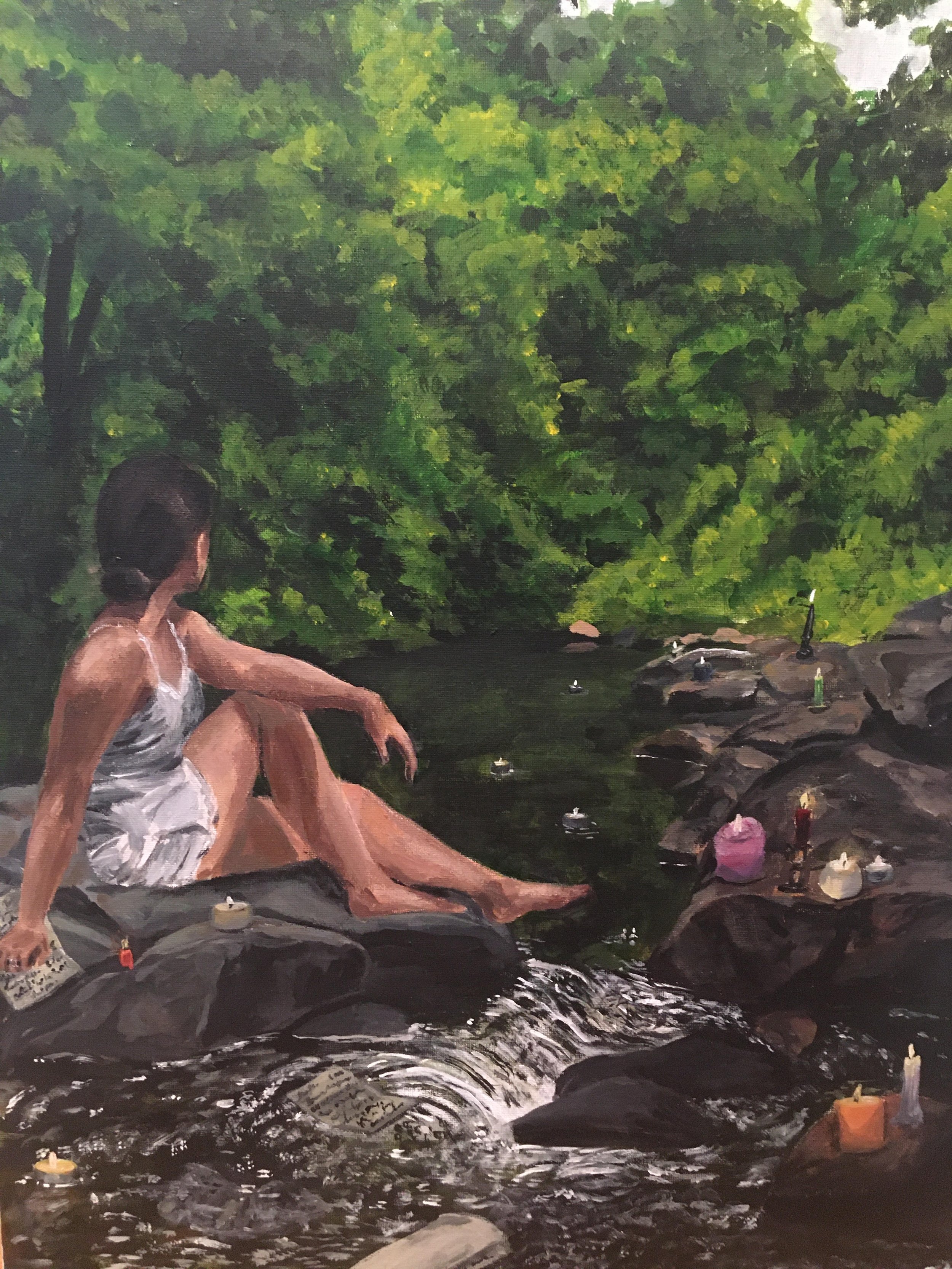Double-Sided Screen
Letters | Maria Sokolowski | Painting
Double-sided Screen by Shirin Ghorbani
On a teetering web-like swing, two children sit, legs swinging in the wind as if they are running through the sky. The sky sings as the vibrant blue swallows the clouds, but as a cloud sneaks behind like a snake waiting to bite, the sun is left hidden. A new view becomes clear. Without the bright gleam of sunlight, the dark eyebags of the children are seen. Exhaustion and sadness seep from their eyes. Legs no longer swinging, birds no longer singing. Stuck to their pasty stone hands lay two bright phones. Their glow only highlights the dimness of the children. Their eyes stay glued to the shining bright rectangles in their hands. The environment stiffens me, choking me on the gloom.
We—humans—like to watch others: the slouching of shoulders, squinting of eyes in the sun, smiling at the little things. It doesn't make sense, when you really think about it, why we like watching things we do so often. But I suppose it lies in the fact that most humans crave one feeling significantly more than the rest, the feeling of being human. Toothy grins left unhidden, not bothered with the possibility of spinach chunks in the crevices of teeth. Their imperfections make us feel normal. We want to feel like everyone else, not because we don't want to feel special, because we most definitely do, but because we want to see the beauty in everyone else, hoping they see that same beauty in us.
As I tilt my camera to clear the blinding rays of sunlight piercing through it, my lens clears up, and I see them. Kids. The essence of humanity, some say, the images of innocence, untainted by politics or corruption. However, in this day we see that is no longer the case; we see children constantly influenced by screens. Their young minds are forced to be at the disposal of the internet as soon as they get a phone. Which they all seem to want, don't
they? I certainly have never seen a kid refuse the gift of a phone. Perhaps kids are more like us than we think, perhaps they want to be like everyone else, normal, like us. At the same time, I can't help but feel angry when I see kids on their phones. Their childhood slips away without them noticing, and all of a sudden they are stuck becoming those they see online, the influencers. I am one to be sure, an influencer, that is. But aren't we all? Don't we all influence others in some way or another? A little girl and boy, sitting on a swing, I can hear the squeaks of the metal bolts colliding with the chain holding them up. While I can hear squeaks, I can't hear squeals. Children at a playground should be laughing, having fun. These kids sit still, unmoving, unwavering, on the teetering web swing. They look dead. Phones glued to their hands, I can't help but feel pity. They are influencing the way I feel: pitiful. They are just as much influencers as I am. I take a quick photo of the scene. Sunken eyes and exhausted stern looks on children who seem to be under the age of ten. My fingers dance over my own phone as I post it on my Facebook. Kids these days, I caption, always on their phones. The post button lights up my eyes, the temptation of going viral, reaching stardom, and being noticed. I will influence, I will teach, I will be loved. This phone in my hand is my ticket to fame. I will never let go.
In a children's playground, a middle-aged man stands. Crumbs of expired scones lie scattered and trapped in the cage of his beard. A stern expression lives on his face. His camera lies forgotten, slung onto his shoulder. Phone glued to his hand as if turning it off would be to turn off his life support. Addicted to the artificial glow he stands still, unwavering, unmoving. He looks dead.
Photographers, always so critical, so judgmental. Many photograph as an excuse to not be the one in the photo. Hypocrites. That's the word, though nobody likes to use it. This one takes photos of people on their phones, while using his phone to post them. He is trapped too, within his phone, possibly even more than his subjects. He thinks he is better than them for being able to acknowledge the problem, but he fails to act on his own accord. A fool's game is never won, for if they cheat you still continue to play. So who's the fool if you play with one? Who is the snake if you critique but don't implement? Who would admit something is wrong but continue? The further you run from the deep end, the more likely you will fall in one behind you. So absorbed in the safety of your own ideas, you run away and laugh when you see opposing ones, but you eventually fall so deep into your fixations you can't swim in the truth, you drown.

